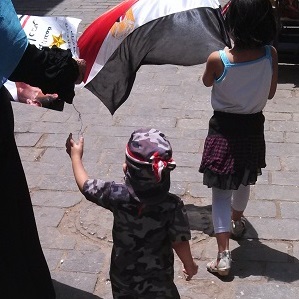The scene at polling stations in Giza’s Dokki District on election day was not that different from the one in al-Gamaleya district, the birthplace of Abdel Fattah al-Sisi.
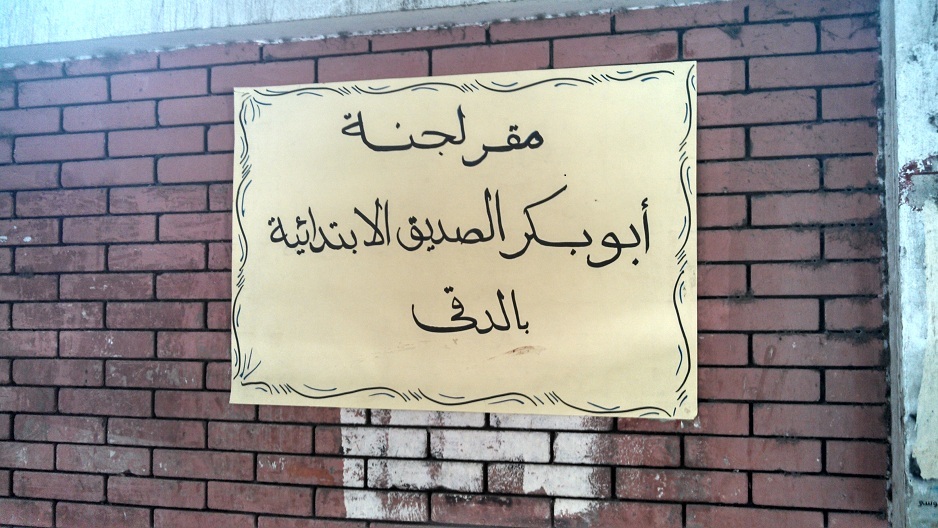 Sign at Abu Bakr al-Seddiq School designating it as polling station
Sign at Abu Bakr al-Seddiq School designating it as polling stationAt Abu Bakr al-Seddiq School in Dokki, a line of about fifty middle aged women ready to cast their votes stretched around the building. One woman proudly walked out of the school showing her palms which read “Yes to Sisi.” Others wore buttons displaying the former general’s face. A sedan parked in the middle of the street opened its trunk to blare popular pro-military hit, “Teslam al-Ayady” on repeat and pretty soon twenty or so voters were dancing in a circle, waving Egyptian flags.
 Woman exits polling station with “Yes to Sisi” written on her palm
Woman exits polling station with “Yes to Sisi” written on her palmSpeaking amidst the background of what seemed to be an impromptu dance party involving anyone in the vicinity, one woman said she was voting for the former field marshal because he would “fight terrorism all over the world” and that he “ended a nightmare.” Another stated that the country “needs a military man right now” so that “Egypt may return to its rightful place” and added that the country will “be the best in the world and everyone will see.”
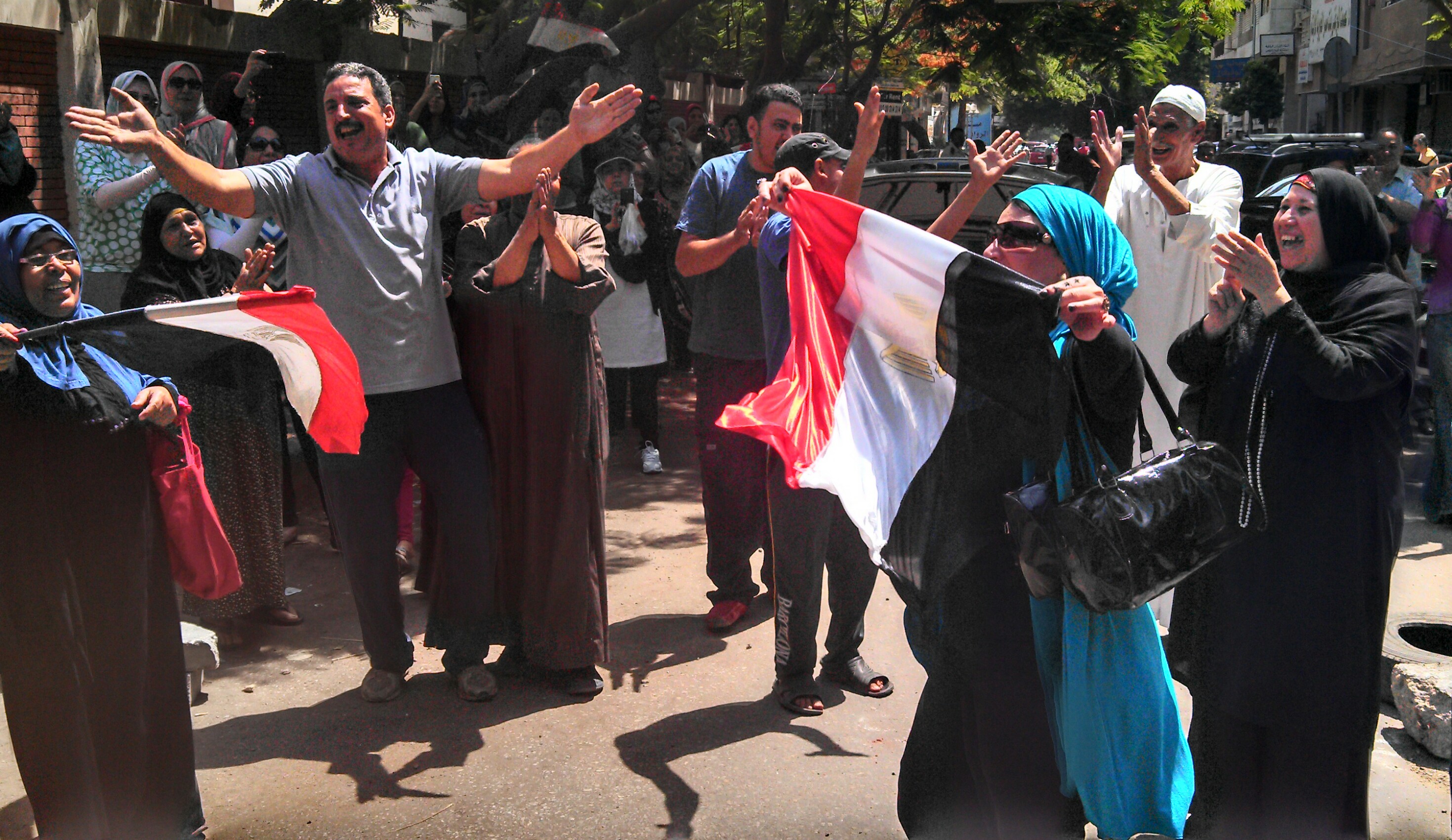 Voters and passersby sing, dance to patriotic songs
Voters and passersby sing, dance to patriotic songs Another polling station down the street was a mirror image of Abu Bakr al-Seddiq. Women chanted slogans: “Where is Al Jazeera? The Egyptian people are here!” and “Long live Egypt.” Their ululations harmonized with others coming from balconies towering above the street. Not a single picture or mention of Sisi’s lone competitor and underdog Hamdeen Sabbahi was to be found at either of the locations.
 Women waiting in line in Dokki chant slogans
Women waiting in line in Dokki chant slogansThe walk to a third polling station at Cairo University’s child rearing college was accented by passersby yelling “Sisi yes!” and cars blasting Teslam al-Ayady among other traditional patriotic songs. The forty-person crowd at the college was made up of middle aged and elderly men, with the exception of two youths. One man acknowledged Sabbahi’s in-depth electoral program but said he was voting for the former general “Because you cannot vote for someone who does not have the military, the media, and the police behind him.”
 Men at Cairo University’s child rearing college wait in line to cast their votes
Men at Cairo University’s child rearing college wait in line to cast their votesThe festive and patriotic atmosphere in Dokki, a district without any personal connection to Sisi, was oddly similar to that of the streets of Sisi’s birthplace in al-Gamaleya district on the first day of voting. Citizens took pains to yell “Sisi!” at passersby from the press, while others wore t-shirts with the general’s face on them. A toddler held his mother’s hand as we walked down the street wearing a military uniform and one man who dared to criticize the general in an interview was ganged up on by four others who angrily yelled at him to “cut it with the nonsense.” When asked why the man could not express his opinion the angry men stated it was because “His opinion is wrong.” On the iconic al-Muizz street, a group of middle aged men and women, and their children danced to the same songs heard in Dokki. A small restaurant owner who worked alongside a sign displaying al-Sisi nestled between former military leaders and presidents Gamal Abdel Nasser and Anwar al-Sadat expressed his faith in a leader who would run the country “the same way Nasser did.”
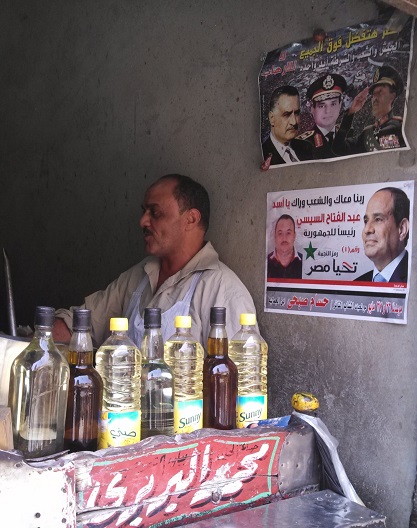
Local restaurant owner expresses his continued faith in military rule
Just as conspicuously absent as he was from Dokki, Sabbahi’s image was once again not seen.
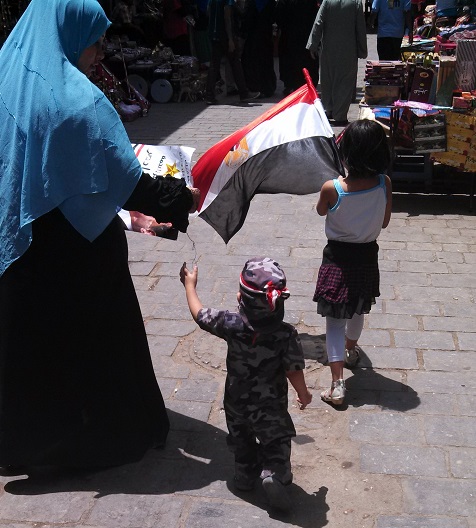
Toddler dressed in military outfit holds mother’s hand in Gamaleya
Amr Kotb is a freelance journalist located in Cairo. Follow him on Twitter @amrqotb
